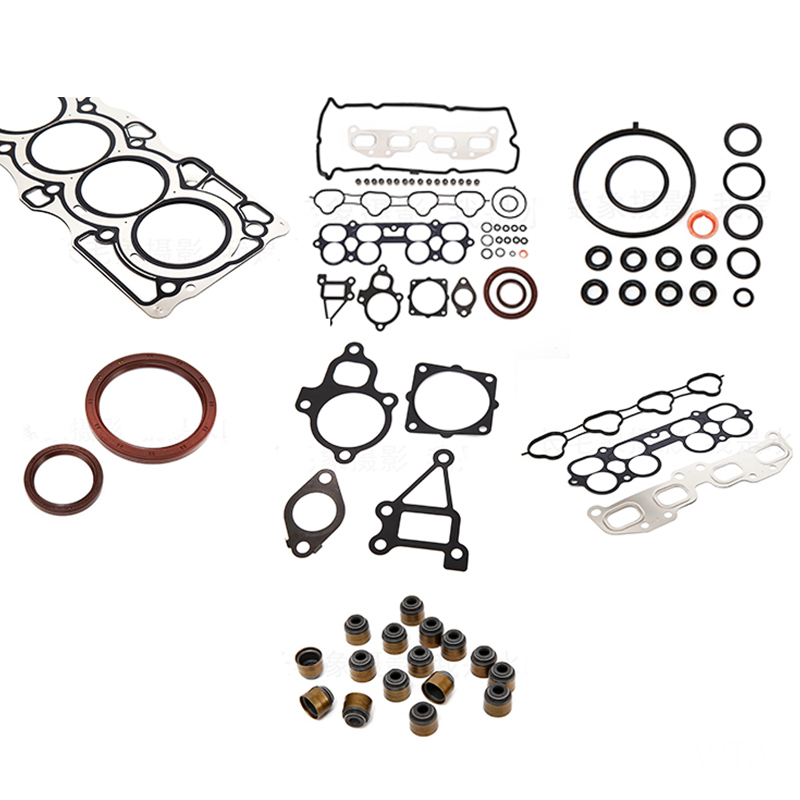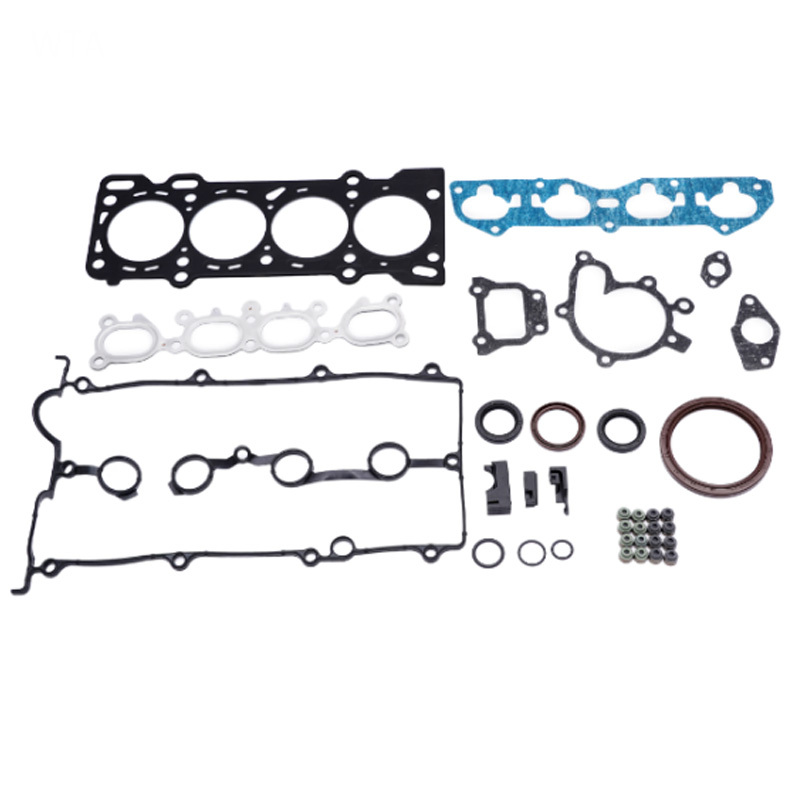Guidelines for replacing exhaust manifold gaskets
All vehicles with internal combustion engines contain several types of seals. Every mechanic and automotive worker must understand the function and failure implications of each part as part of their core job responsibilities. The exhaust manifold gasket is one of the highest priority replacement parts because it has the greatest potential for failure.This guide will tell you when and how to replace the exhaust manifold gasket.

The importance of an exhaust manifold gasket
A mechanical seal, also known as an exhaust manifold gasket, is made up of several engraved steel layers. Manifold gaskets are manufactured in four main forms, including high-temperature fiber materials, graphite, and ceramic composites and their various combinations.
The engine component acts as an elastomeric element to provide a leak-tight seal between the cylinder head and manifold assembly. Most automotive engine systems require only one exhaust manifold gasket for proper operation. The V6 and V8 engine types require two exhaust manifold gaskets for proper operation.
All gaskets found in a car engine system, including flange gaskets and O-ring gaskets, share the same material composition as the exhaust manifold gasket. Everyone involved in the automotive industry should understand this principle.
What does an exhaust manifold gasket do?
The gasket is the connection between the manifold and the cylinder head. The manifold acts as a collector of exhaust gases before sending them to the exhaust pipe, while at the same time drawing in fresh air into the vacuum space created by the gas flow.
This process is similar to the way the human lungs work together with the respiratory system. The manifold, together with the cylinder head, acts as a respiratory system, pushing out used gases and drawing in fresh air. Over time, better performance is achieved because the manifold gasket seals the opening to prevent leaks that can cause temperature fluctuations.
The exhaust manifold gasket helps maintain smooth driving performance and increased engine power. The component provides exceptional value during engine operations that require high performance. The exhaust manifold gasket serves a dual purpose, directly performing its function while also helping to protect the catalytic converter.
Signs of exhaust manifold gasket failure
The exhaust manifold gasket typically develops faults due to normal aging, but this is not always the case. This particular problem tends to affect older vehicles rather than newer models with minimal mileage.
Routine vehicle maintenance serves as a beneficial method of detecting developing problems, saving vehicle components from additional damage and system-wide deterioration. There are several signs that your exhaust manifold gasket needs to be replaced.
Loud engine noise
The exhaust manifold gasket seals the connection between the cylinder and the manifold unit. Any problem with the gasket will result in an immediate leak. A distinctive hissing sound combined with spitting or knocking noises signals the start of the problem.
The noise will get worse if the problem remains unresolved. Gasket noise is most noticeable when the vehicle is accelerating or starting from cold, making diagnosis easier when working on customer or employee vehicles.
Vehicle problems that produce loud noises will manifest themselves as specific noises under certain driving conditions.
Reduced fuel efficiency
When a vehicle's fuel economy changes from its original performance, it indicates that a component needs attention. A faulty exhaust manifold gasket leak is one of several possible causes of this problem. Investigation of this problem becomes necessary when it is accompanied by other symptoms.
Drivers tend to identify this problem as one of their first observations. The main consequence of poor fuel efficiency is a dramatic increase in weekly fuel costs. The majority of people will recognize this problem immediately, leading them to contact automotive experts such as yourself to determine the cause of the problem.
The problem will get worse over time. The defects will become apparent shortly after they start to show.
Reduced power or acceleration
A faulty exhaust manifold gasket gives plenty of time to rectify the problem, as it will not cause the vehicle to break down. A noticeable loss of power, together with reduced acceleration, occurs when leaking gases adversely affect engine performance and efficiency in all driving conditions.
The first time the engine is started, you may notice the symptom, which will gradually become more noticeable. The car will experience reduced speed capability together with delayed gear changes on challenging slopes.
The repair process for this problem should be simple, but it can take a long time to complete due to rusty nuts and bolts. Early detection is an important factor for both mechanics and drivers.

Exhaust manifold gasket replacement procedure
Workers in the automotive industry need to repair seals in a variety of circumstances. Mechanics carry out these repairs during the annual servicing that customers request. A consumer who notices the symptoms mentioned above will need you to diagnose and repair.
Dealers need to replace gaskets on newly purchased vehicles, and company owners need to do this when servicing their fleets. The procedure for replacing a faulty exhaust manifold gasket (or gaskets) is as follows, regardless of the number of gaskets to be replaced.
Tool preparation
1. New exhaust manifold gasket kit
2. Ratchet wrench
3. Impact wrench and sockets
4. Coolant container
5. Carb cleaner
6. WD-40
7. Shop rags
8. Steel wool and grit sandpaper
Of course, you will need a torch and protective equipment such as gloves and goggles.
Remove the faulty exhaust gasket
Before removing the battery, disconnect the positive and negative cables from the electronic components.
2. Use the ratchet wrenches to remove the engine cover bolts.
3. The exhaust manifold gasket must be exposed, which means that any objects blocking the path must be removed in a safe manner. The procedure for accessing the exhaust manifold varies considerably between manufacturers and vehicle models.
4. Removing the heat shield requires unscrewing bolts located at the top or side of the manifold.
5. Apply WD-40 lubricant to the nuts and bolts of the faulty exhaust manifold as well as the bolts that connect to the exhaust pipes.
6. Use a socket wrench and ratchet to remove the bolts holding the exhaust manifold and cylinder head together. After removing the manifold, pull it out of the exhaust pipe.
7. After removing the manifold, you can easily pull out the exhaust gasket. A scraper tool will be required to remove the exhaust gasket if it is stuck to the cylinder head.
You must carry out cleaning operations before proceeding with the installation of new parts.
Replace the new manifold gasket
Install the manifold gasket onto the cylinder head bolts, then apply anti-seize to the bolts.
2. Install the new gasket by placing it at the bottom of the exhaust pipes and at the base of the exhaust manifold, applying anti-seize to both parts before final assembly.
3. Install the exhaust manifold onto the cylinder head bolts.
4. Follow the vehicle handbook recommendations for tightening the cylinder head bolts to achieve a flash position against the cylinder.
5. Tighten the exhaust manifold nuts to the correct torque.
6. The heat shield and engine covers, coolant lines, and air filters must be reinstalled as part of the installation process. Refill the radiator.
7. Reconnect the battery.
The next step is to check the engine after the procedure has been completed. Listen for unusual noises and be alert to both low power and burning odors.
Conclusion
A successful exhaust manifold gasket replacement is the foundation for maintaining proper engine efficiency and smooth operation in your vehicle. Your vehicle's optimal performance depends on eliminating loud engine noises, reduced fuel efficiency, and power loss to prevent additional damage. Combining the correct replacement steps with premium components ensures your results will last. WTA GASKET is a reliable option when you need an exhaust manifold gasket. Our highly efficient team operates under an impeccable management system to deliver the highest quality automotive engine seals and gaskets to meet your specific requirements. The precision and reliability of WTA solutions are available to customers requiring OEM or ODM solutions. Contact us to find the right seal for your vehicle.

Signs of a Blown Head Gasket: Warning Symptoms, Causes & Prevention Tips

Engine Overhaul Gasket Kit – Product Introduction

Building Trust Beyond Borders: A Long-Term Partnership with Our Dubai Client

Hazards of Gasket Oil Leaks and Prevention Measures in Automotive Applications

Oil Seals in Cars: Their Function, How to Identify, and Replace Inferior Seals
OEM&ODM
What is your terms of delivery?
EXW, FOB
How do you make our business long-term and good relationship?
1. We keep good quality and competitive price to ensure our customers benefit,
2. We respect every customer as our friend and we sincerely do business and make friends with them. no matter where they come from.
What is your sample policy?
We can supply the sample if we have ready parts in stock, but the customers have to pay the sample cost and the courier cost.
How about your delivery time?
Generally, it will take 5 to 7 days after receiving your advance payment. The specific delivery time depends on the items and the quantity of your order.
Do you test all your goods before delivery?
Yes, we have 100% test before delivery.




STAY IN TOUCH WITH WTA
Have any questions or queries about our products? Please leave us a message here and our team will get back to you promptly.
Your inquiries, ideas, and collaboration opportunities are just a click away. Let's start the conversation.


 Scan QR Code
Scan QR Code
Tik Tok
YouTube
Facebook
LinkedIn
Scan QR Code
Whatsapp: +8618922275934
Whatsapp: +8618922276204
Whatsapp: +8618922271543